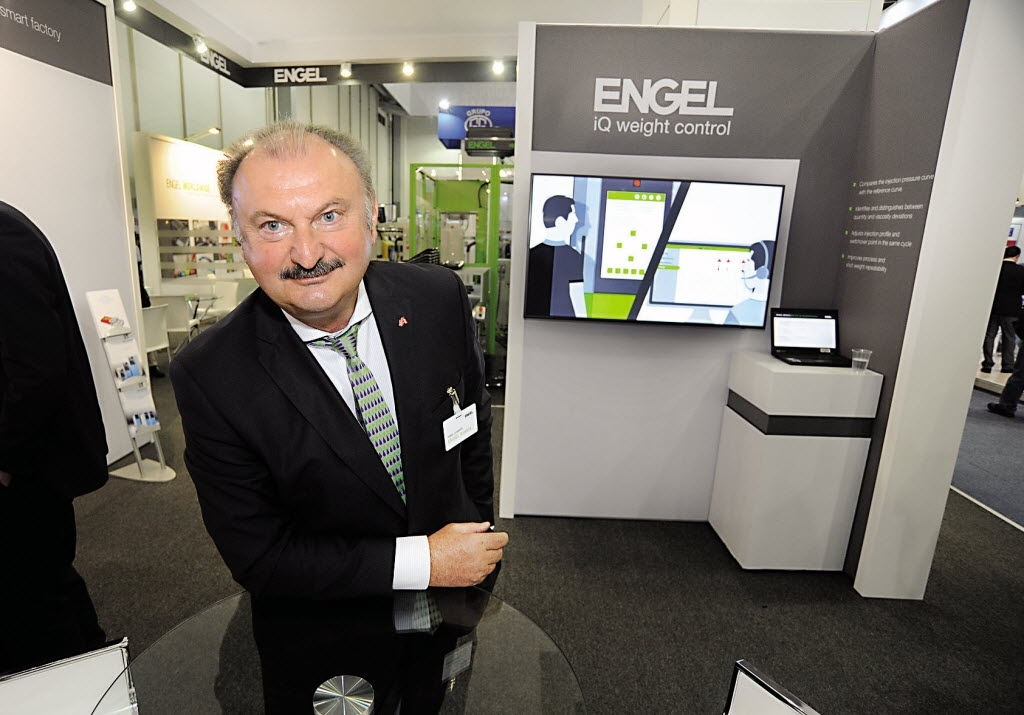March 23, 2016 Updated 3/23/2016
Email Print

Michael A. Marcotte Walter Jungwirth, who heads the Mexico operations of Engel Holding GmbH, at Plastimagen 2016.
Mexico City — Walter Jungwirth, who heads the Mexico operations of Engel Holding GmbH, is a 38-year Engel veteran.
He joined the Austria-based machinery and robot manufacturer in 1978, and the following year, made his first trip to Mexico. Molders were not very impressive back then in the country, he said.
In the past decade, automotive production has exploded in Mexico. Jungwirth said car production has changed even in just the last five years.
“I see a lot of changes,” Jungwirth said March 10 at Plastimagen in Mexico City. “Before, quality was not up-front. Now it is. And now we have automation. Injection machines of 300 tons and above, automated. Mold-changing devices. So in my opinion, Mexico caught up very fast with international standards.”
And the reason why, he said, is “Because all the international companies are coming here, and they’re not lowering their standards.”
Mexico’s automotive market is as red-hot as a habañero pepper. That’s the biggest part of the plastics-growth story. “Yes, it’s in automotive. But you also can see similar developments in medical and packaging,” Jungwirth said.
Jungwirth sat down with Plastics News and discussed the Mexican market in an interview at Engel’s busy booth during Plastimagen. He is director general of Engel de Mexico SA de CV in Queretaro.
Jungwirth has served in a number of positions at Engel, based in Schwertberg, Austria, including executive vice president of sales and marketing, president of the press-maker’s North American operations, leader of the global business unit for packaging and global business developer.
Q: What is your impression of Mexico’s plastics industry today?
Jungwirth: What excites us at Engel is the quality standards. Traveling through the country, we see it — and I really have to emphasize, we see fantastic setups. The plants and equipment are state-of-the-art.
Q: I’ve heard that Engel has surpassed other major European machinery manufacturers to become the biggest player in Mexico.
Jungwirth: Well, we respect our competitors. But Engel is a major force [in Mexico], be it on the machine side, be it on the technology side, and be it on the service side.
Q: Mexico’s automotive industry trade group, AMIA, has reported that 77.4 percent of all light vehicles that are assembled in Mexico get exported to the United States. But Mexico still imports 70 percent of the components for those vehicles. What’s your opinion?
Jungwirth: The 70 percent [of imported components] I find relatively high now. But it is an issue, yes.
Q: We have reported that big European automakers like BMW often bring their own suppliers to Mexico. So that kind of supplier will buy injection press brands they already use in its own country — be it Engel say, or KraussMaffei or another make?
Jungwirth: Yes.
Q: But in general, to which areas is Engel selling a lot of automotive machines in Mexico? Is it to suppliers, or to OEMs, the carmakers themselves?
Jungwirth: Mainly to Tier 1s. OEMs as well. But the Tier 1 supplier is our major customer. Of course, we also sell to Tier 2s.
Q: In my interview with Milacron at Plastimagen, their Latin American director, Juan Carlos Gonzalez, said that, measured by volume of units, most of Milacron’s sales in Mexico go to the domestic Mexican processors. But measured in cash-volume, the multinational companies are biggest. What is Engel’s experience?
Jungwirth: We see a lot of Mexican customers. But we also we see a lot of greenfield installations. They’re starting out here. And this, of course, is big business for us.
Q: At Plastimagen, Engel is molding a yogurt cup in an in-mold labeling cell with an e-motion 440/160 injection press, equipped with Beck Automation’s new flexible Beck-Flex IML automation. What’s the status of IML in Mexico?
Jungwirth: It’s coming. With packaging, it’s not just meeting demand [for basic packages]. For example, that’s why we show in-mold decorating. You know, change of technology.
Q: Packaging is an end-market that follows the economy and the growth of incomes. But clearly, Mexico’s economy is getting hit with heavy pressure from the Mexican peso’s value against the strong dollar, and plunging oil prices, which have cut into tax income for the government. Mexico’s central bank just lowered its 2016 economic growth forecast to 2 to 3 percent, down from the previous 2.5 to 3.5 percent. How does this impact the market for presses to mold packaging?
Jungwirth: It is impacting us with the Mexican customer. But we have a lot of international customers — they might buy in Austria. They might buy in France. They might buy in the U.S. They might buy in Germany, in euros. Then it doesn’t matter. They have other choices. But for the Mexico customers, you offer financing let’s say in euros. It’s a risk factor.
Q: How else do the country’s economic pressures affect packaging machines?
Jungwirth: It is impacting the packaging. Because, I just had a very big company in yesterday [at Plastimagen] where they told me the sizes they make will be smaller. It could be shampoo or whatever. They make the sizes smaller [to reduce the shelf price]. But for the packaging industry this is good!
Q: Turning to medical, what is the mix of medical products made in Mexico shipped to the United States, vs. for domestic use within Mexico?
Jungwirth: I would say 40-60 — 40 percent for export, and 60 percent local, roughly.



























